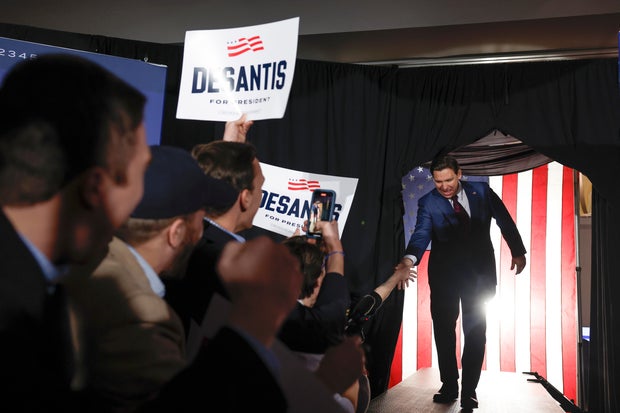[ad_1]
Florida Gov. Ron DeSantis suspended his presidential campaign on Sunday, posting a video on X saying he could not ask his campaign staffers to give their time “without a clear path to victory.”
“It’s clear to me that a majority of Republican primary voters want to give Donald Trump another chance,” DeSantis said.
He added that he had signed a pledge to support the eventual nominee. As he left the race, DeSantis took a parting shot at opponent Nikki Haley. Trump, he said his video, “has my endorsement because we can’t go back to the old Republican guard of yesteryear — a repackaged form of warmed-over corporatism — that Nikki Haley represents.”
Soon after DeSantis announced he was dropping out of the race, Haley told reporters, “He’s been a good governor and we wish him well,” and noting that the race is now down to “one fella and one lady,” she added, “May the best woman win.”
Anna Moneymaker / Getty Images
After placing a distant second in Iowa, losing to former President Donald Trump by 30 points, DeSantis has failed to articulate his path to the nomination and what states he would be able to win against Trump, dropping out of the race two days before the New Hampshire primary.
He had invested large amounts of time and money in trying to win Iowa, as he and his super PAC bet that an aggressive approach of retail politics and building a ground game operation would result in an upset or a closer race.
On the campaign trail, DeSantis, 45, pitched himself as a more effective figure to implement some of Trump’s policies on immigration or curbing government spending, and that Trump’s legal cases could cost Republicans the White House in a general election.
DeSantis’ record in Florida was an anchor of his candidacy, often pointing to his response during the COVID-19 pandemic and legislative record on taxes, his handling of the state’s budget taxes and his six-week abortion ban. He pointed to his 20-point re-election win in Florida as a data point of electoral success he’d have as the Republican nominee.
But since his glitchy launch on X (formerly Twitter) “spaces” in May 2023, DeSantis’ campaign had struggled to create a convincing argument for voters to pick him over Trump.
He saw his polling gap with Trump in the early states widen as the former president went on the attack against him, claiming he was disloyal and disparaging him “DeSanctimonious.” Trump’s campaign and allies spent millions on anti-DeSantis ads and trolled him on his personality, his footwear and internal dysfunction with his campaign.
His campaign appeared to be overspending early on, straining its financial resources and cutting staff heading into fall of last year.
The campaign struggled to generate high fundraising numbers throughout the campaign — especially as Haley won support from GOP donors looking for a non-Trump candidate.
Throughout his run, a pro-DeSantis super PAC, “Never Back Down,” had an outsized role not traditionally seen in presidential campaigns, running the grassroots operations and door knocking in the early states. The super PAC hosted DeSantis as a “special guest” for a majority of his campaign events because his presidential campaign was low on funds.
Never Back Down saw a high-profile turnover of leadership in November and December, after conflicts over advertising strategy, increased involvement on the PAC’s board from DeSantis loyalists from Tallahassee, and overall frustration with the governor’s position in the polls.
Legally, campaigns and super PACs cannot coordinate because super PACs are not subject to any fundraising limits. The heavy involvement by Never Back Down prompted a formal complaint to be filed by the Campaign Legal Center.
While DeSantis argued that he could whittle the race down to a two-person matchup against Trump, DeSantis failed to establish himself as the clear Trump alternative, especially as Haley saw a rise in the polls in Iowa and New Hampshire after her strong debate performances in the late summer and fall.
Asked in January on New Hampshire radio whether he believes he should have waited until 2028 — when he likely wouldn’t be facing Trump — to launch a run, DeSantis replied, “I don’t know what [20]28 is gonna look like. I may not have the calling then. I had the calling now. I think the party supporting me would lead to great results over an eight year period.”
“Obviously with Trump in, it’s more difficult,” he added.
Nidia Cavazos contributed to this report.
[ad_2]
Source


